Cervical cancer is preventable, testing is important
We are currently not accepting referrals for Pap/ HPV testing.
To request a free self-screening kit, visit screeningbc.ca/cervix or call 1-877-702-6566. The kit includes step-by-step instructions and all necessary materials to collect a sample safely and privately.
What to Expect: The self-screening process involves using a swab to collect a sample from the vagina. This method is designed to be easy to use and can be completed in the comfort of your home. Once collected, the sample is mailed to a laboratory for analysis. Results are typically available within a few weeks, and if necessary, follow-up care will be arranged.
Why This Matters: Cervical cancer is largely preventable with regular screening. By participating in the HPV self-screening program, you can take an active role in your health and help detect potential issues early, when they are most treatable.If you have further questions or need assistance with the screening process, please don't hesitate to reach out to your healthcare provider or contact the screening program directly
HPV
Human Papilloma Virus (HPV) is the most common sexually transmitted infection (STI). You can get the virus anytime when you're sexually active. Almost 8 out of 10 Canadians will get an HPV infection in their lifetime.
HPV spreads from person to person, though skin-to-skin contact
( penetration is not required) or during genital, anal or oral sex. There is no cure for HPV once you're infected.
HPV is the cause of most cervical cancers. After breast cancer ,cervical cancer is the second highest cause of death in women between the ages of 20 and 44. 1550 women are diagnosed with cervical cancer annually in Canada, for 400 of those women, it is fatal.
There are 118 different strains of HPV. Most are not harmful. However, 14 HPV genotypes signify high-risk for developing cervical cancer. HPV causes genital warts and can also lead to anal, mouth, penile, vaginal, vulvar and throat cancers.
In most cases, HPV infection has no noticeable signs or symptoms, as a result, you just don't know when you or your partner are infecting ,or being infected by someone else. The body’s immune system destroys the infection within a couple of years. When HPV persists with high-risk strains, there is an increased risk of developing cervical cancer.
Cervical cancer, however, is preventable.
In response to the need for more accessible screening, British Columbia has launched Canada's first HPV self-screening program. This initiative allows women aged 25 to 69 to collect their own samples at home, offering a more comfortable and private alternative to traditional Pap tests. The self-screening test is highly accurate, with a higher sensitivity and negative predictive value than the Pap test, meaning it can more effectively identify individuals at risk of cervical cancer .
There is currently no approved HPV test for men.
How to Access the Self-Screening Kit:
To request a free self-screening kit, visit screeningbc.ca/cervix or call 1-877-702-6566. The kit includes step-by-step instructions and all necessary materials to collect a sample safely and privately.
What to Expect: The self-screening process involves using a swab to collect a sample from the vagina. This method is designed to be easy to use and can be completed in the comfort of your home. Once collected, the sample is mailed to a laboratory for analysis. Results are typically available within a few weeks, and if necessary, follow-up care will be arranged.
Why This Matters: Cervical cancer is largely preventable with regular screening. By participating in the HPV self-screening program, you can take an active role in your health and help detect potential issues early, when they are most treatable.If you have further questions or need assistance with the screening process, please don't hesitate to reach out to your healthcare provider or contact the screening program directly
HPV Vaccine
Gardasil9® is the only HPV vaccine available in Canada. It protects against nine HPV types, seven of which can cause cervical cancer and two that cause genital warts.
If you are already infected with one type, the vaccine still protects against the others.
In BC, the vaccine is provided free to children in Grade 6, and catch-up programs are available for eligible youth and certain high-risk adults up to age 26. It can be given to anyone up to 45 years old through prescription, and older individuals can request it privately.
The cost for those not publicly funded is roughly $190–$225 per dose, with a three-dose series totaling $570–$675.
The vaccine is safe, effective, and most beneficial if given before exposure, but still provides protection when given later. Gardasil9® can be accessed at pharmacies, public health clinics, and some healthcare providers.
Frequently Asked Questions
- There are two styles of IUDs available in Canada:
Hormonal progesterone-based IUDs (Mirena and Kyleena) continuously release low levels of levonorgestrel, which is a progestin much like the hormone progesterone produced by the ovaries. Levonorgestrel thickens cervical mucous, so sperm and ovum do not meet. It also thins the lining of the uterus, making it an excellent choice for women with heavy periods.
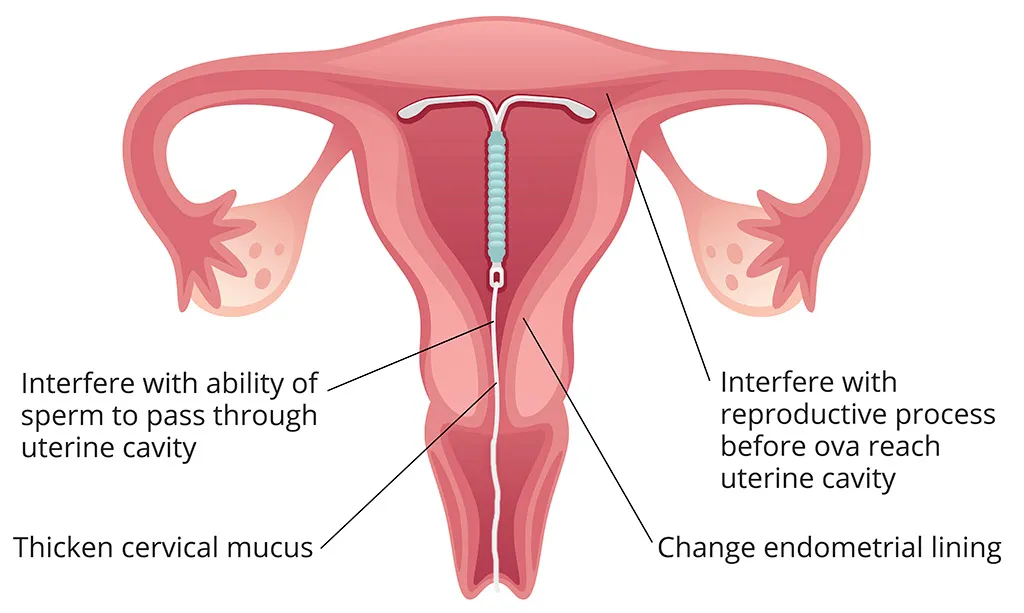
- Non-hormonal /copper-based IUDs release copper into the uterus and prevent pregnancy by stopping sperm from fertilizing an egg and reducing sperm movement.
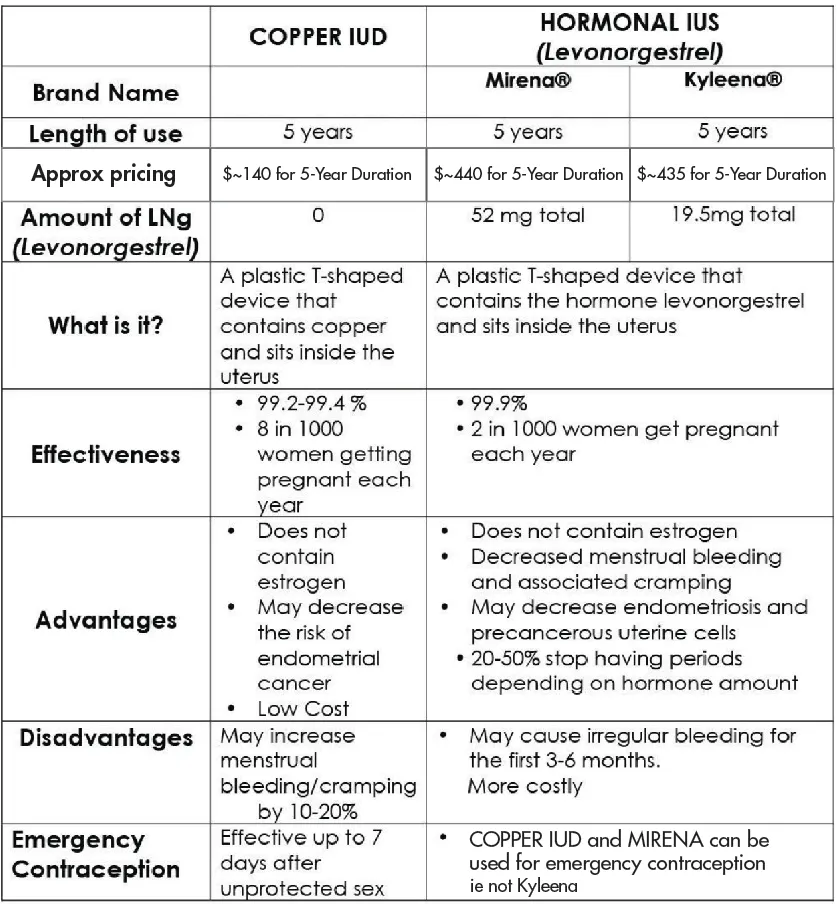
- IUDs are Estrogen free. This reduces your risk of a blood clot
(Smokers should avoid estrogen containing contraception). - IUDs have less hormonal side-effects than the pill, patch or ring which contain both estrogen and progesterone.
- IUDs are safe for breastfeeding.
- IUDs do not cause hormone-related facial pigmentation like chloasma or melasma.
- An IUD provides long-term contraceptive protective for five to 10 years, which makes it the cheapest form of birth control available.
- You cannot forget it, skip it or mess it up. As long as it is in position in the uterus it works.
- It is also convenient, as you do not have to remember to take pills or apply patches or rings regularly.
- Because the IUD cannot be seen or felt, it is private. It is your choice to share information about the IUD.
- In 60% of women using Mirena, menstrual flow becomes lighter or can stop altogether. It is an excellent treatment for women with heavy and or painful periods.
- IUDS are very reliable birth control for women who are not allowed to get pregnant due to medical reasons including women taking Accutane for acne.
- When you are ready to become pregnant, your healthcare provider can easily remove the IUD by pulling on the strings with no long-term effects on your fertility or future pregnancies . IUDs do not stop ovualtion, so return to fertility is immediate.
- IUDs can be used for Emergency contraception ( if placed within 7 days after unprotected sex eg. broken condom.
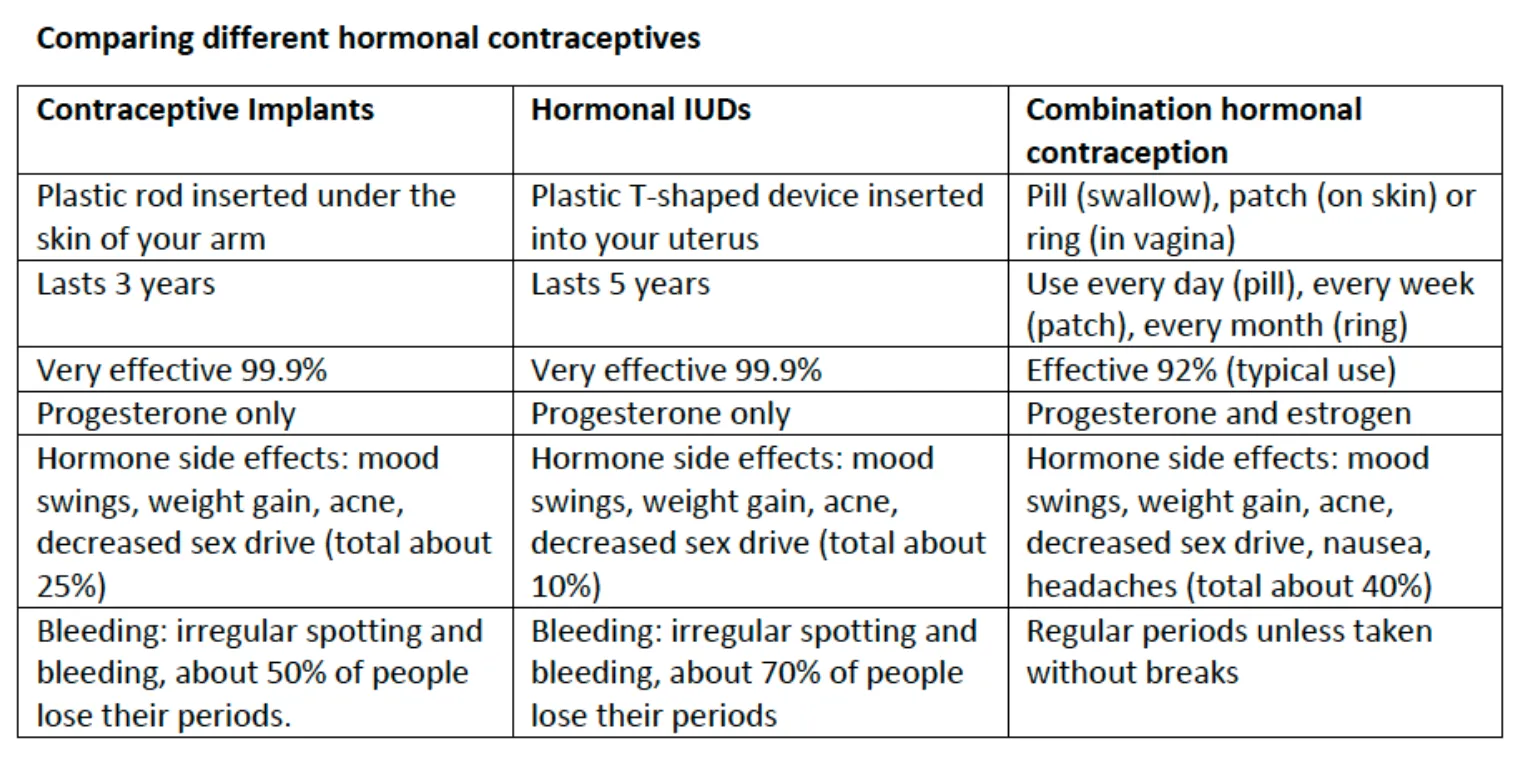
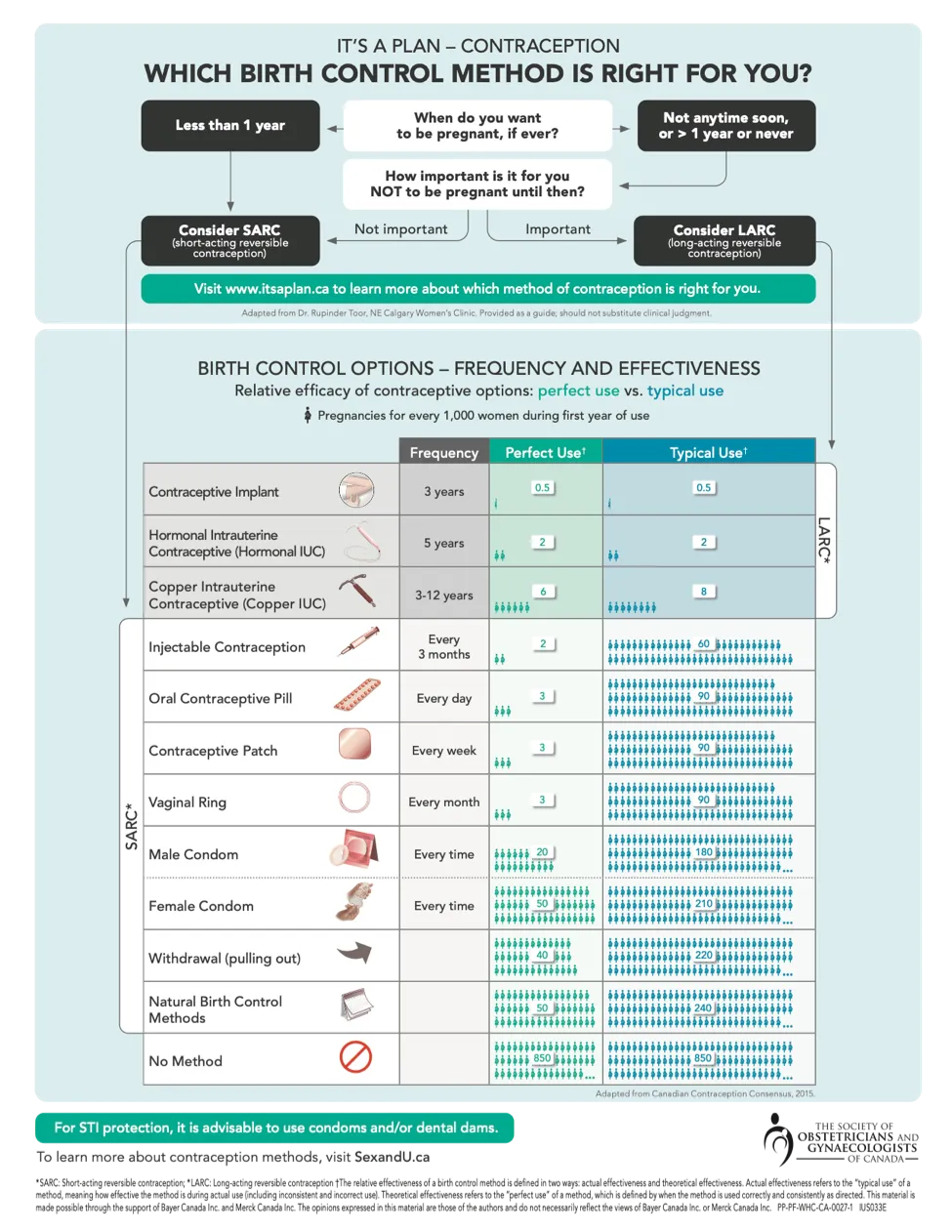
- The above chart shows the number of pregnancies for each method. Perfect use is derived from clinical trials and does not represent real-life outcomes. Typical use failure rates are real to life.
- No.
Hormonal IUDs can be used to improve quality of life by reducing menstrual flow in women with heavy bleeding and to improve painful periods. - Hormonal IUDs improve Iron deficiency anemia in women with heavy periods.
- Hormonal IUDs can be used to manage pain and bleeding in patients with endometriosis.
- Many athletes who do not want their periods get hormonal IUDs.
- IUDs are very reliable for women who have medical reasons that don’t allow pregnancy, such as women taking Accutane for the treatment of acne.
- Copper IUDs are great for women who can not tolerate hormonal birth control as they are hormone free.
- Certain Copper IUDs and Mirena IUD can be used for emergency contraception if placed within 7 days of unprotected sex.
- No. With hormonal IUDs, the lining of the uterus generally does not thicken, so does not need to be shed (that is your period).
- In fact, the progestin released from hormonal IUDs inside the uterus, protect against abnormal cell changes in thelining that could lead to uterine cancer.
- In 60% of women using Mirena, menstrual flow might become lighter or stop altogether. By the 6th month, 1 in 5 women with MIRENA no longer menstruate, making it an excellent option for women with heavy periods.
- Many. You don’t have to remember to take it, and it is a discrete, private choice.
- IUDs are a good choice for women who have an increased tendency to blood clotting, including deep vein clots, or pulmonary embolism eg. women who smoke nicotine.
- They work for 3-5-10 years (depending on the style) which makes them the most cost-effective method of birth-control.
- IUDs are also easy to remove should you wish to become pregnant, with no long-term effects on your fertility or future pregnancies.
- Hormonal IUDs can benefit women with endometriosis (redue pain and bleeding) and irregular periods (polycystic ovarian disease).
- IUDs have been shown to reduce the risk of uterine and cervical cancer.
- IUDs do not protect against sexually transmitted infections. Always use condoms for STI protection.
- Hormonal IUDs may cause irregular bleeding and spotting, which can take several months to settle because the uterus can take time to adjust to the hormones. This is not serious and requires patience.
- About 10% of women with hormonal IUDs have them removed for hormonal side effects like acne, weight gain or mood changes.
- Copper IUDs may cause heavier, longer and/or more painful periods, but this typically improves within a few months. Women with heavy and or painful periods should avoid Copper IUDs, as it could worsen your symptoms.
- Women with low iron should also avoid copper IUDs.
- Rarely (< 1% ) the IUD can :
injure (perforate) your uterus wall—this is not serious and heals on its own. It will not cause any problems later with fertility. - fall out (expulsion) - this is more commeon if an IUD is placed in the post partum period (after a baby).
- moves outside the uterus (migration) - in this event minor surgery is required to remove the IUD
- When your doctor inserts the IUD inside the uterus, the strings, made of plastic threads, are cut about 2 cm from the cervix.
- To check them, first, wash your hands. Then, while sitting or squatting, insert your index or middle finger into your vagina until you touch the cervix, which will feel firm and rubbery. Feel for the IUD string ends coming through your cervix. If you feel the strings, it is in place and should be working.
- If the strings feel longer or shorter than the last time you checked them, or if you feel the hard part of the IUD against your cervix, your IUD may have moved. In this instance, you should use condoms and see a doctor. Do not try to push the IUD back yourself. Also, never pull on the IUD strings.
- If you're worried your IUD has moved, use backup birth control until you can see your doctor. Perform a home pregnancy test to exclude pregnancy. If your doctor cannot locate the strings during a pelvic exam, she may order imaging tests like a pelvic ultrasound to confirm the location of the IUD.
- It is rare for your IUD "to move out of place" if properly placed by a skilled inserter. If this does happen it usually occurs in the first few months. Symptoms that could indicate your IUD is malpositioned include abnormal bleeding or pelvic pain .
- Usually, they have tucked themselves into the cervical canal or uterus. The strings can be easily swept back into view by your doctor during a pelvic exam using a device called a cervical cytology brush. Sometimes, a pelvic ultrasound is useful to confirm your IUD is in the womb.
- Missing strings might be a sign that the entire device has " fallen out " from the uterus. This is very rare but reinforces the need to check your strings regularly.
- Sometimes a partner can feel the strings, so you may wish for them to be cut shorter. Once cut, it can be challenging to check for strings and you will need to be seen by a skilled health-care provider when your IUD is due for removal or you desire pregnancy.
- No. Your IUD will continue to work just as effectively, regardless of how many sexual partners you have.
- This happens rarely. If it does, have the IUD removed as soon as possible.
- If you choose to change contraceptive methods, wish to plan a pregnancy sooner or discontinue use, an IUD can be easily removed by a healthcare professional. It is usually a simple process done by inserting a speculum and using the threads to slide the IUD out from the uterus through the cervix. Some experience brief cramping during removal.
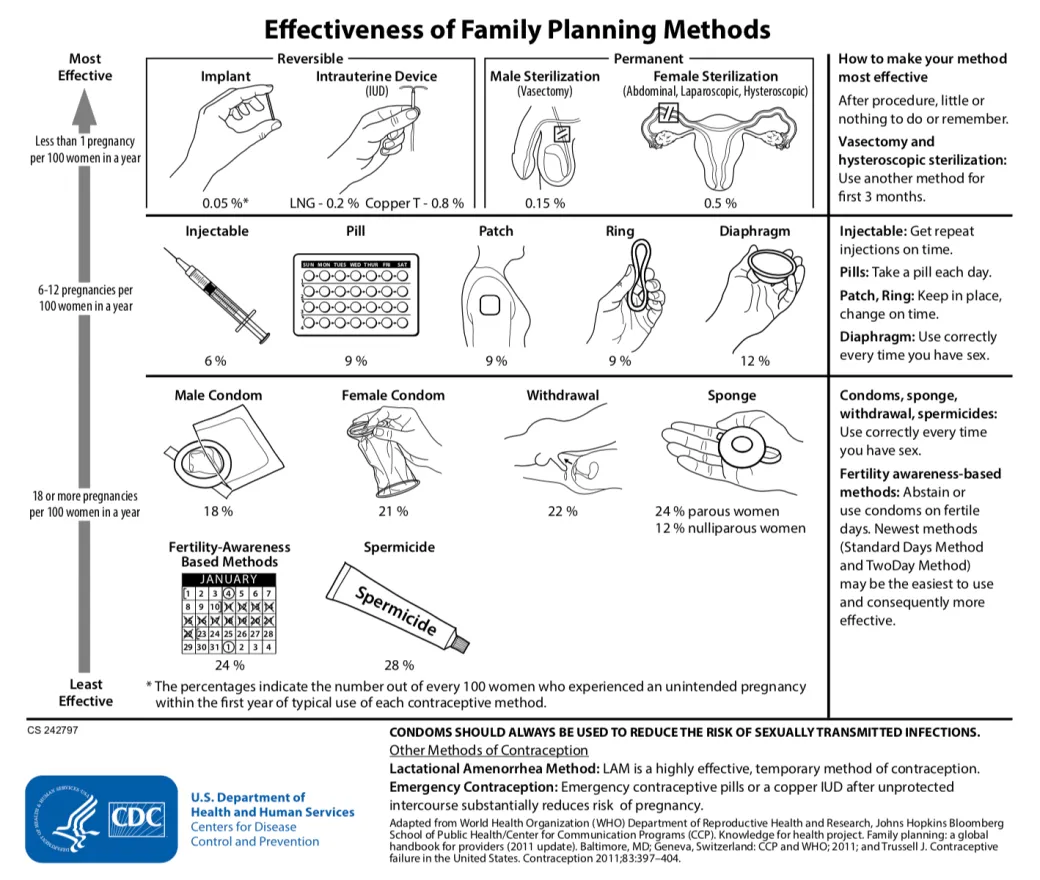
- Both methods are excellent forms of birth control.
Nexplanon ® is 99.95% and lasts for 3 years.
Hormonal IUDs are 99.8% and lasts for 5-7 years depending on the age it was inserted.
Copper IUDs are 99.2% effective and last 3, 5 or 10 years depending on the type. - IUDs are placed inside the uterus and impact the uterine lining while the subdermal implant (Nexplanon ®) is placed under the skin of the upper arm and works by inhibiting ovulation (release of an egg from the ovary).
- You will be able to predict your menstrual bleeding pattern with IUDs i.e. with a non-hormonal Copper IUD you will have a regular cycle whereas with a hormonal IUD you are more likely to have light spotting or no bleeding at all.
- With Nexplanon ® for most women, your period will stop or you might have infrequent bleeding . However, for a small percentage of implant users, periods could become unpredictable , longer, and/or more frequent.
- IUDs are placed inside the uterus and are very discrete.
- Nexplanon ® is placed under the skin of the upper arm. It is very discrete, yet it is still easy for you to feel under the skin of your arm with your fingertips. It feels like a small flexible rod about the length of a matchstick.
- Some women gravitate towards one form based on the type of procedure used to place the device, and other women might lean towards intrauterine (inside the uterus) versus subdermal (under the skin).
- Cost might be a factor.
- Generally Copper IUDs are the least expensive ( ~ $140), Hormonal IUDs cost ( ~ $430) and Nexplanon ® costs ( ~ $360).
- If you need further information, the experts at the IUD clinic in Langley would be happy to guide you.

- The Canadian Pediatric Society states that “long-acting, reversible methods of contraception should be the first-line birth control option for youth.” These methods have the lowest failure rate and are first-tier options.
- If you're not sure which IUD to choose or whether you should consider Nexplanon® Subdermal Implant, you are not alone.
- We are here to help provide you with the information you need to guide you , as well as assist you in gaining confidence in your contraceptive decisions.
- IUDs and Nexplanon® Contraceptive Implant, simply put, are the most effective non-permanent methods of birth control.
- Getting pregnant unexpectedly or at the wrong time in a woman's life can be very traumatic. Taking the big step towards effective contraception can allow you to focus on your personal and occupational goals, without any major surprises.
- The following position statements have been made by Canadian and International Societies regarding the use of IUDs and Nexplanon® Subdermal Implants:
- The Society of Obstetricians and Gynecologists of Canada (SOGC) and the American College of Obstetrics and Gynecology (ACOG), recommend Long-Acting reversible contraception as the first-line contraceptive choice for preventing pregnancy for all sexually active women.
- The Canadian Pediatric Society states that long-acting reversilbe methods of contraception ( IUDs or implant) should be the first-line birth control for youth as these methods have the lowest failure rate and are first-tier options.
- The World Health Organisation (WHO) recognizes reproductive and sexual health care as a fundamental human right.
